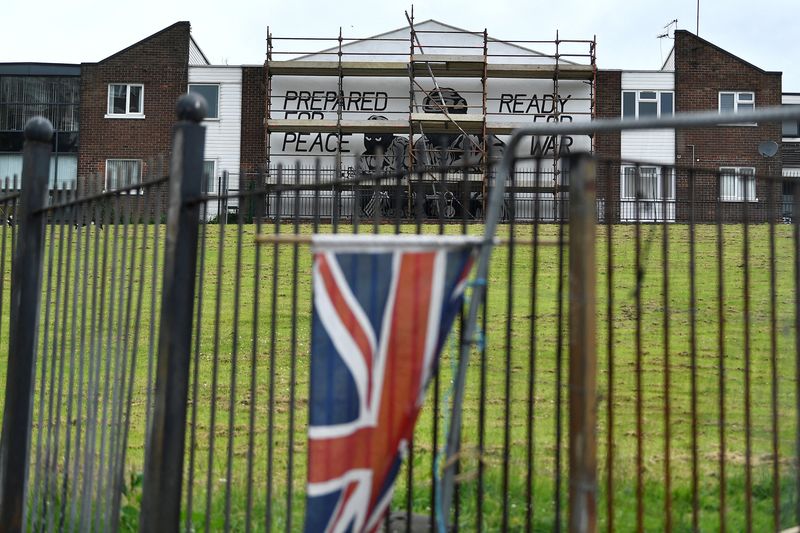

© Reuters. FILE PHOTO: A Union flag hangs on railings near a mural reading “prepared for peace, ready for war” is seen on the side of a building in the Mount Vernon area of Belfast, Northern Ireland June 21, 2022. REUTERS/Clodagh Kilcoyne
By Amanda Ferguson and Conor Humphries
BELFAST (Reuters) – Northern Ireland’s largest unionist party faces a historic dilemma if EU and British negotiators clinch a post-Brexit trade deal: redraw their red lines or risk signing a death warrant for decades of power-sharing with Irish nationalists.
The Democratic Unionist Party (DUP) could take a chance and endorse a Northern Ireland Protocol deal that is all but certain to fall short of its stringent demands but that would open the door for more radical rivals to outflank the party.
The alternative: reject the deal, double down on its boycott of Northern Ireland’s devolved parliament and potentially call into question key planks of the Good Friday Agreement just as world leaders prepare to mark the 25th anniversary of the 1998 peace deal that ended three decades of sectarian violence.
David Kerr, former adviser to David Trimble, the principal unionist signatory to the peace accord in the British province, said the deal could be in “real difficulty” if the protocol and power-sharing fail.
“A positive resolution to the protocol issue is not just very beneficial for everyone living in Northern Ireland, it is strategically vital for the future of Northern Ireland’s place within the United Kingdom,” Kerr said.
With London and Brussels keen to put their post-Brexit spat over Northern Ireland behind them, the European Union said on Monday progress was being made in talks on reworking the trade rules, which kept the province in the EU’s single market for goods to avoid a hard border with EU member state Ireland.
The renegotiation was triggered by anger among unionists and supporters in London of Britain’s exit from the EU about the imposition of checks on some goods arriving in Northern Ireland from the rest of the United Kingdom.
Opinion polls, however, have consistently shown a majority of Northern Irish voters back the protocol, with 54% in favour of the rules with their current lighter touch application and 34% opposed, according to a regular Queen’s University Belfast survey last conducted in October.
While the UK as a whole voted to leave the EU in the 2016 Brexit referendum, Northern Ireland voted 56% to 44% to remain.
‘NOT INCAPABLE OF COMPROMISE’
DUP leader Jeffrey Donaldson told Reuters the talks were “very much being held in secret” from unionists but said he was not “paranoid about betrayal” from the British government.
The DUP, he added, is not incapable of compromise. “We don’t want to make the perfect the enemy of the possible,” he said.
But if there is no agreement unionists can support, Northern Ireland will continue to have no functioning political institutions, he said, “and I don’t think that is an outcome that anybody really wants”.
Peering over the DUP’s shoulder, however, is a party that says it is comfortable with the collapse of power-sharing with Irish nationalists Sinn Fein and the end of devolved power if necessary: the Traditional Unionist Voice (TUV).
“If the choice is Sinn Fein rule or even imperfect British rule I would certainly take British rule before I would take Sinn Fein rule,” said TUV leader Jim Allister.
He warned that opposition to the protocol could “heavily feature” in local elections in May.
While Allister is the only TUV lawmaker elected to the 90-seat devolved assembly, his party’s support trebled to 7.6% at elections to it last year when the DUP sank seven points to 21%, leaving Sinn Fein, the ex-political wing of the guerrilla Irish Republic Army, to become the largest party for the first time.
The compromise that the protocol represents to British sovereignty “should be anathema to any democrat. But apparently there is a new breed of colonialists in our midst,” Allister said, in reference to the EU.
Further to the unionist extreme lies the Loyalist Communities Council, which claims to represent loyalist paramilitary groups, the sectarian opposite of the old IRA.
“I would certainly be concerned about violence,” said council chairman David Campbell. “My worry would be a new generation coming forward that have a much more malign intent, and would be looking at targets in the Republic of Ireland and elsewhere. People will look where they feel the blame lies.”
Completing the intense pressure Donaldson is under from all sides as the defining moment of his leadership nears is the more liberal Ulster Unionist Party, ready to cast itself as the unionist party of pragmatism if the DUP’s boycott escalates.
“We may say that’s a bad deal … But at least if we were in government… we have the ability to question, amend, change, block all of these things,” UUP leader Doug Beattie said.
“If we’re not in government, we can do nothing. What will ultimately protect Northern Ireland’s place in the United Kingdom is if Northern Ireland works.”






